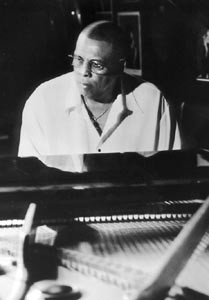![[Metroactive Music]](/music/gifs/music468.gif)
[ Music Index | San Jose | Metroactive Central | Archives ]
 Equatorial Beat: Chucho Valdés, with his band Irakere, has been at the forefront of the resurging interest in Latin jazz.
Equatorial Beat: Chucho Valdés, with his band Irakere, has been at the forefront of the resurging interest in Latin jazz.
The Throb Of the Action Chucho Valdés injects African elements into Latin dance music By Marianne Messina THROUGHOUT POP MUSIC'S courtship with Latin dance traditions, an up-and-down affair spanning 50-odd years, Chucho Valdés has been at the throb of the action. His father, Cuban pianist Bebo (Ramon) Valdés, owned a Havana casino in the 1940s that hosted the likes of Dizzy Gillespie, Sarah Vaughan and Buddy Rich. These were the younger Valdés' musical references from the age of three. By the time he was 18, he'd already put together his own trio and cut two albums with RCA. When he formed the band Irakere in the 1970s (the name loosely translates "equatorial forest"), Valdés was at the forefront of a movement seeking to reintegrate pure African elements into the genre. Long before Peter Gabriel, Sting and Paul Simon directed the pop spotlight to Africa, Irakere was infusing its work with Congo rhythms, Yoruba and Lucumi speech patterns, and authentic bata and yuka drums. Yet Chucho maintains his innovations were just a natural continuation of what his father had been doing. Between embargo politics and the fickle American pop industry--one minute wanting salsa, the next, ballads--Valdés saw only middling exposure in the United States until recently. And well after receiving a Grammy Award nomination for Best Latin Jazz Performance in 1994, Valdés had problems getting into the country to promote his Blue Note CD Briyumba Palo Congo. Valdés intended that Briyumba be an "homage to the religion of the Congo people," underscoring the soul (in all senses) at the core of his genius. When Valdés is asked about his improvisations, he says they're "whatever comes at the time ... a series of things that you carry inside." Those things include taut rhythmical tensions that come alive like primal energies in up-tempo songs such as "Put the Time on It" (Briyumba) and "Anabis" (Live at the Village Vanguard). Valdés sees the piano as both a harmonic and rhythmic instrument, and he can apply himself equally well to both modes, piling curt percussive chords on top of dextrous mellifluence, or alternating them in a succession of moods. In a samba, he might use the piano to outline a ghost bass part, providing melodic bottom in a rhythmical off-beat. When the senior Valdés expatriated to Sweden, Chucho Valdés stayed in Cuba, feeding his music but separating from the father he admired and emulated. He once told an interviewer, "I have not been able to do anything superior to what he as done." And yet had he not stayed to evolve the complex blend represented in his recent solo albums, he would have been separated from his musical soul. It wasn't until 1994 that both men saw the rewards of their choices. Then 77 years old, Bebo Valdés made a comeback album, the same year son Chucho was nominated for a Grammy Award for Best Latin Jazz Performance. Since then, Chucho Valdés has played the Kennedy Lincoln Center as a featured pianist, and in June of this year Briyumba Palo Congo and Live at the Village Vanguard were awarded Latin Jazz Album of the Year honors by the Jazz Journalists' Association.
Chucho Valdés performs as part of the Stanford Jazz Festival on Monday (July 31) at 8pm at Dinkelspiel Auditorium, Stanford. Tickets are $25. (650.725.ARTS) [ San Jose | Metroactive Central | Archives ]
|
From the July 27-August 2, 2000 issue of Metro, Silicon Valley's Weekly Newspaper.
Copyright © 2000 Metro Publishing Inc. Metroactive is affiliated with the Boulevards Network.
For more information about the San Jose/Silicon Valley area, visit sanjose.com.